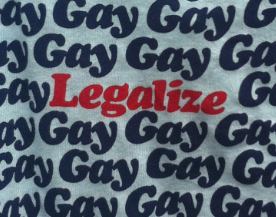 Yesterday, the 6th Circuit Court upheld same-sex marriage bans in four states. Their decision was the opposite of four other federal court decisions on this issue, all but ensuring it will end up in the hands of the U.S. Supreme Court.
Yesterday, the 6th Circuit Court upheld same-sex marriage bans in four states. Their decision was the opposite of four other federal court decisions on this issue, all but ensuring it will end up in the hands of the U.S. Supreme Court.
Their 2-1 decision, as explained in the majority opinion (read it HERE), was flawed, something made obvious and clear in the first sentence of the majority opinion:
This is a case about change — and how best to handle it under the United States Constitution.
That is NOT what this case was about. This case was about the constitutionality of same-sex marriage bans which have been found by lower courts to violate equal protection for our citizens under the Fourteenth Amendment. Period.
There are many other flaws in their arguments (you can read some salient excerpts HERE) but the fact that the two judges who voted to uphold the bigoted bans on marriage equality decided the way they did based on a flawed premise makes the rest of their comments all but moot.
Circuit Judge Martha Craig Daughtrey, who wrote the lone dissent, excoriated her colleagues:
The author of the majority opinion has drafted what would make an engrossing TED Talk or, possibly, an introductory lecture in Political Philosophy. But as an appellate court decision, it wholly fails to grapple with the relevant constitutional question in this appeal: whether a state’s constitutional prohibition of same-sex marriage violates equal protection under the Fourteenth Amendment. Instead, the majority sets up a false premise—that the question before us is “who should decide?”—and leads us through a largely irrelevant discourse on democracy and federalism.” […]
More than 20 years ago, when I took my oath of office to serve as a judge on the United States Court of Appeals for the Sixth Circuit, I solemnly swore to ‘administer justice without respect to persons,’ to ‘do equal right to the poor and to the rich,’ and to ‘faithfully and impartially discharge and perform all the duties incumbent upon me . . . under the Constitution and laws of the United States.’ If we in the judiciary do not have the authority, and indeed the responsibility, to right fundamental wrongs left excused by a majority of the electorate, our whole intricate, constitutional system of checks and balances, as well as the oaths to which we swore, prove to be nothing but shams.
The two conservative judges who voted in the majority, Justices Jeffrey Sutton and Deborah Cook, appeared to buy Michigan Attorney General Bill Schuette’s argument that marriage is for baby making, saying:
By creating a status (marriage) and by subsidizing it (e.g., with tax-filing privileges and deductions), the States created an incentive for two people who procreate together to stay together for purposes of rearing offspring. That does not convict the States of irrationality, only of awareness of the biological reality that couples of the same sex do not have children in the same way as couples of opposite sexes and that couples of the same sex do not run the risk of unintended offspring.

This is an absurd argument that relegates married couples without children, particularly those without the ability to have children, to some sort of accidental legal limbo. Judge Daughtrey spelled this out in her dissent:
Not surprisingly, children from broken homes with lower-income-earning parents who had less education and lived in urban areas performed more poorly in school than other children. According to Rosenfeld, arguments to the contrary that failed to control for such differences, taken to their extreme, would lead to the conclusion that only high-income individuals of Asian descent who earned advanced degrees and lived in suburban areas should be allowed to marry.
It is possible that the full Circuit Court, comprised of 16 judges, could overturn the decision by the three-judge panel but that’s unlikely since lawyers for both sides want things to move quickly into the hands of the U.S. Supreme Court.
Meanwhile, Equality Michigan is likely to coordinate a ballot initiative to put Michigan’s same-sex marriage ban on the 2016 ballot:
Statewide LGBT advocacy group Equality Michigan will likely pursue a ballot initiative to allow gay marriage in Michigan, Executive Director Emily Dievendorf said Thursday night.“We have to take this to the ballot, which we’ve already laid the foundation for,” Dievendorf said.
A group called Marriage Michigan PAC had pushed for a ballot measure to legalize gay marriage in 2014. Equality Michigan didn’t support the 2014 ballot effort, but kept the possibility open for 2016. With the U.S. Sixth Circuit Court of Appeals upholding Michigan’s current ban, the ballot initiative is looking more likely.
“We’ve been pursuing that the whole time. We’ve just been laying the groundwork,” Dievendorf said.
She pointed to Michigan for Marriage, a nonprofit group made up of Equality Michigan, the American Civil Liberties Union, business owners, Freedom to Marry and other advocates.
One of the main roles of our judicial system is to protect minority groups from “the tyranny of the majority”. Just like it was completely appropriate for courts to overturn racist marriage bans for biracial couples, so too is it completely appropriate for them to overturn same-sex marriage bans.
Change has been coming fast for marriage equality, faster than most other social changes. That makes roadblocks like these, thrown up by homophobic opponents, all the more galling. In another decade when marriage equality is the law of the land – the ENTIRE land – those who opposed it will be looked on with derision in the same way those who opposed civil rights are looked upon today.



